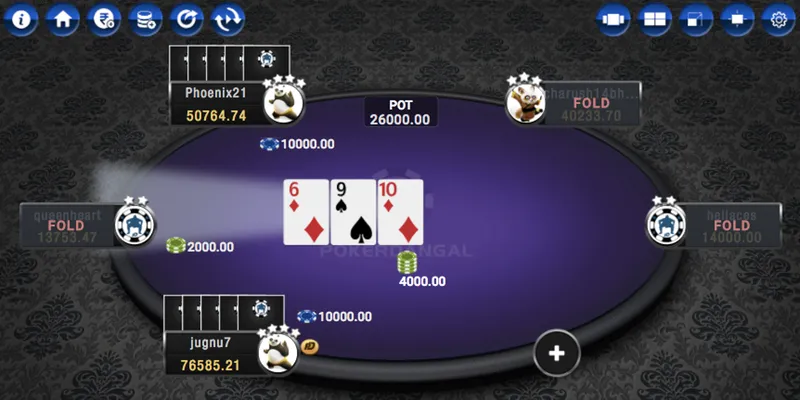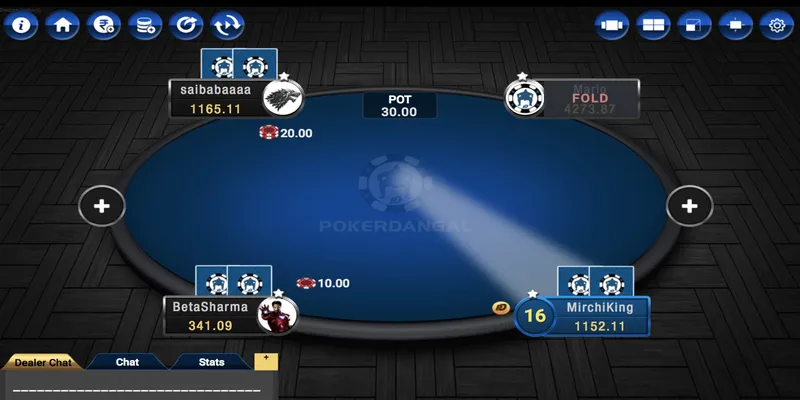Meet the Delhi entrepreneur who built a Rs 40 Cr online poker business in 2 years
Started in 2017 by Varun Mahna and three other co-founders, Poker Dangal scaled up quickly, becoming one of India’s top five online poker platforms. Read to find out how Varun did it.
Varun Mahna was first introduced to poker while he was studying at BITS Pilani in 2005. A card game featuring several variations and numerous strategies, poker relies on combinations made with players' cards to determine the winners.
Varun, his friend Varun Puri, and others would hole up in their hostel rooms to play the card game for hours. He then joined XLRI Jamshedpur, where poker was popular as well. As he played more games, Varun’s love for the game grew. When he started working for Star Sports, he switched to online poker.
“Nothing beats a live and physical game, according to purists. But people get busy and prefer convenience. It is not easy or always possible to organise a physical game. So, many people make the switch to online poker,” he explains.
Varun started playing a lot of online poker games. This is when he noticed a trend that would go on to transform a small business idea into a multi-crore one.

Varun Mahna, Founder and CEO, Poker Dangal
“Online poker was trending and demand was increasing rapidly. However, there was a gap between demand and supply. As a consumer, the three or four existing online poker platforms didn’t offer great service and technology,” he says.
Seeing an opportunity to disrupt the online poker market, Varun decided to start his own business - a small and new player that could, ideally, meet the extra demand.
In 2017, Varun along with engineering batchmate Varun Puri and two other co-founders Shashwat Jain and Karan Gandhi, started Xeta Networks, under which they launched Poker Dangal, an online poker platform. Varun says they invested Rs 30 lakh from their personal savings, and began working at a friend’s house.
Registered in Kolkata, Poker Dangal is headquartered in Delhi, with small offices in Kolkata and Chennai.
The online poker gaming experience
The Poker Dangal platform is available on desktop, Android, and iOS, and users can play three variations of poker: Texas Hold’em (the most popular in the world), four card pot limit Omaha, and five card pot limit Omaha.
“We were the first player to introduce five card pot limit Omaha. Right now, it is the most popular variation of poker on the platform,” Varun says.
He attributes the variation’s popularity to its high speed and the large number of probabilities and possibilities it opens up for players.

A snapshot of Poker Dangal's five card pot limit Omaha game
“It appeals to the statistical and analytical abilities in people,” he explains.
Under the three poker variants, players can choose to play a number of individual cash games or a tournament.
Varun identifies three principles that determine how good a player is at poker: emotional control, analytical ability, strategy.
But he points out that in terms of emotional control and analytical ability, there is not much difference between a physical and an online game.
“The only difference between the two is the strategy a player uses. In a physical game, a player can change his/her strategy based on observations made about other players. However, the strategy may still not be foolproof,” he says.
Another difference is that an individual can only play at one table at a time, but on Poker Dangal, they can play at multiple tables simultaneously.

A snapshot of Poker Dangal's Texas Hold'em game
Two-fold revenue model
Poker Dangal generates revenue in two ways: charging service fees on wagers and charging entry fees for tournaments.
“Every hand is charged. On average, we charge a three to four percent service fee on every hand that is wagered on the platform,” Varun says.
These service fees are applicable to individual cash games as well as tournament games.
“From tournaments, we also make revenue on entry fees. For instance, we announce a ten-player tournament with a Rs 1,000 payout guarantee for winners. We charge each player Rs 110 to enter the tournament. Out of Rs 110, we put Rs 100 into the pot. If ten players enroll, the pot is worth Rs 1,000. We keep the remaining Rs 10,” he explains.
However, if less than required number of people join a tournament (ten in this case), Varun says Poker Dangal covers the cost of the deficit.
Poker Dangal’s approach to online poker worked so well that the small business quickly grew into one handling lakhs of users on a monthly basis. It gets around 1.2 lakh active users on a monthly basis, Varun claims, and four to five thousand active players per day.
With service and tournament fees levied on each of these players, the company estimates it will record a revenue of Rs 40 crore this year. Varun also says it recorded Rs 200 crore worth wagers and entry fees last quarter and broke into the top five online poker platforms in India.

The Xeta Networks and Poker Dangal founding team
Customer focus
Poker Dangal’s users are typically males between the ages of 18 and 35. Varun says that the most number of Poker Dangal users are from Delhi (11 percent of the total). Mumbai, Bengaluru, and Chennai follow.
But the gaming platform is also seeing traction from Tier II cities such as Jaipur, Patna, Indore.
“Patna and Indore together makes 13 percent of our user base, which is higher than Delhi,” Varun says, adding, “Another positive trend is that the number of female users is increasing.”
He claims there is a 50-50 split between desktop and smartphone users, and that over 85 percent of smartphone players use the Android app.
“Since October this year, we have seen a 30 percent increase in traffic. We are attributing it to Diwali. However, the amounts wagered have remained the same,” he says.
To keep users happy, Varun and his team came up with an instant cash-out system as well as a loyalty programme. Users can withdraw their winnings to their bank accounts at any time, and the transfer is instantaneous, he says.
For winnings above Rs 10,000, the government taxes users 30 percent, similar to winnings from other online gaming platforms.
Users can also win gifts, ranging from headphones and smartphones to bikes and cars, through Poker Dangal’s loyalty programme. “By playing more games, users accumulate Dangal points. These can be converted into cash or gifts,” Varun says.

The Poker Dangal team
Legality and potential for growth
Online poker has become increasingly popular as most states consider online poker legal on the premise that it is a game of skill rather than luck.
Besides Adda 52, which has been around 2011, new entrants include PokerRaj, backed by industrialist Raj Kundra, Pokerstars, one of the world’s largest online poker brands, owned by the Stars Group, and others such as Spartan Poker, Poker-Baazi, Realpoker, and Khelo365.
But Telangana, Odisha, Assam, and others, have banned online gaming entirely.
“If the outcome of an online game is based on skill, then it is okay to monetise the game. Poker falls under this category. If it is purely luck or chance-based, then it cannot be monetised,” he explains.
With no legal issues presently, Varun aims to take Poker Dangal to new heights and become one of the top three players in the Indian online poker market in the next 18 months.
“The market is still nascent, and I expect it to blossom. Online poker platforms are scalable and profitable,” he says.
A KPMG report estimates the online gaming industry in India at Rs 4,380 crore (FY 2018), and projects it will grow at a CAGR of 22.1 percent and touch Rs 11,880 crore by FY 2023. In this spectrum, online card games are growing at 50-100 percent year-on-year.
Some investors have taken notice. Varun says an Indian investor, who he does not name, funded Poker Dangal with Rs 2.5 crore in exchange for equity.
“We were able to scale rapidly after the investment. We became a customer-centric organisation and focussed on engaging our users through attractive UI/UX and our loyalty and referral programmes,” he says.
The company also built a random number generator software, which Varun labels its “heart and soul”. Explaining that it is used to ensure new cards are drawn at random, he adds, “Every poker platform should have its own random number generator software. Ours is certified by an Australian lab.”
Despite scaling up and estimating revenue of over Rs 1,000 crore, Varun still feels educating the masses about poker is a challenge. According to him, the game is still seen in a bad light.
“Poker is often associated with bad habits such as gambling,” he says.
He earmarks the constant evolution needed to survive in a hyper-competitive online poker industry as another challenge facing Poker Dangal.
“In this industry, one needs to always upgrade in order to survive. We were bootstrapped initially and hardly had money for us to spend on development. But we captured the market despite this, while other players spent huge budgets of, let’s say, Rs 10 crore,” he adds.
Besides the aim of bringing online poker to the masses, Varun plans to venture into rummy and fantasy gaming.
“People are still skeptical about online gaming but the trend is changing. We want to ready ourselves and capture more of the market,” he says.





1563874718888.png?mode=crop&crop=faces&ar=16%3A9&format=auto&w=1920&q=75)



-with-the-team.png?mode=crop&crop=faces&ar=1%3A1&format=auto&w=1920&q=75)